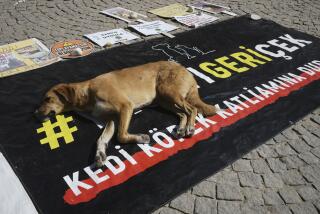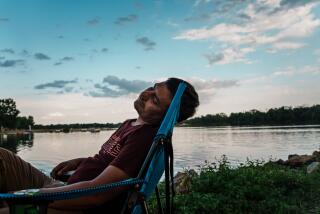Bulgaria Accused of Harshness in Forced Assimilation of Ethnic Turks
- Share via
PARIS — Zeynep Ibrahimoglu was renamed Suzan Isaeva by the state of Bulgaria, then spent 17 months in prison and two years in internal exile for resisting the change.
Ismet Ismailogllu was renamed Ilko Ilzev Panov. His right leg and back are scarred--marks he said he suffered during a police attack for his resistance to the name change.
The two, attending a human rights conference here, are among hundreds of ethnic Turks expelled last month by Bulgaria for resisting an assimilation campaign.
The campaign went into force in 1984. It reportedly includes banning the use of the Turkish language in public, closing mosques, and razing Turkish cemeteries--in short, wiping out any trace of the Muslim Turkish minority.
Given Bulgarian Names
“Now, everyone has an identity card with a Bulgarian name,” said a Turkish delegate to the Paris conference, speaking on condition that he not be named. “Officially, the Turks no longer exist.”
Bulgaria is becoming a prime target at the monthlong Conference on the Human Dimension, the first of three such meetings mandated in January during a session of the Conference on Security and Cooperation in Europe.
The United States and other countries are expected to demand that Bulgaria account for what Turkish Foreign Minister Mesut Yilmaz has called “one of the gravest human rights violations of our time.”
Bulgaria has repeatedly denied charges that it oppresses its Turkish minority, estimated to number 900,000 to 1.5 million in a total population of about 9 million. President Todor Zhivkov said such reports are a “campaign of slander” concocted by Turkey and Western groups.
Unrest Began in May
The plight of ethnic Turks in Bulgaria has been gaining attention since early May, when unrest over the assimilation campaign broke out. Official Bulgarian reports say three people died in recent clashes. But reports from deported ethnic Turks put the death toll at about 30.
Amnesty International said that about 100 ethnic Turks have died since the assimilation campaign began.
Six expelled Bulgarian Turks are attending the Paris conference. They are demanding that Bulgaria restore the rights of ethnic Turks to retain their cultural heritage or, at least, allow them to freely leave the country.
Habib Ibisoglu, a former member of Turkey’s Parliament from the port city of Varna, said he left Bulgaria as a tourist in 1986 and never returned.
“I wanted to speak of Turkish problems in Bulgaria . . . and they wouldn’t let me,” he said. “I left to speak on the outside.”
Take in Refugees
Mumin Gencoglu, president of the Federation of Balkan Turks and Assns. for Emigres and Refugees, said that various Turkish groups took in about 500 expelled Bulgarian Turks in May. Those expelled often arrive in Turkey without money, possessions or family.
“Bulgaria is my country, but I wasn’t happy there,” Ibrahimoglu said in an interview. “Bulgaria was for me like an artificial mother. It wasn’t my real mother. I was a second-class citizen.”
Ibrahimoglu, 30, a language student from the village of Kliment near the northeastern town of Shumen, said she was given a new name and identity card on March 12, 1985.
“I wanted to leave Bulgaria after this,” she said through an interpreter. Arrested in Bucharest, Romania, in front of the Turkish Embassy, she was returned home, tried for leaving the country illegally and sentenced to prison in Sliven.
“We worked, the food was terrible and when they caught me speaking Turkish with other women, I was put alone in a cell,” she said.
Internal Exile
She then spent two years in internal exile in a town 250 miles from her village. When the two years were up, she joined a human rights group, which she said was the reason she was expelled Feb. 3.
She now lives in Turkey with her mother and brother, who were permitted to leave with her.
Ismet Ismailogllu, expelled May 25, raises the leg of his pants to show fresh wounds from what he said were the teeth of a police dog. Other marks run down his back, the remnants of a beating he said he received May 22 when military police raided his district in Kurdzhali, in southern Bulgaria.
Ismailogllu, 35, who worked as an accountant at a government cooperative, was secretary of a solidarity and human rights group for ethnic Turks.
“All the members of the association were beaten,” he said. After the raid, they were forbidden to leave their homes, “so we didn’t even know if someone next door was dead or alive.”
“I will try now to love Turkey as my country,” he said.
More to Read
Sign up for Essential California
The most important California stories and recommendations in your inbox every morning.
You may occasionally receive promotional content from the Los Angeles Times.












